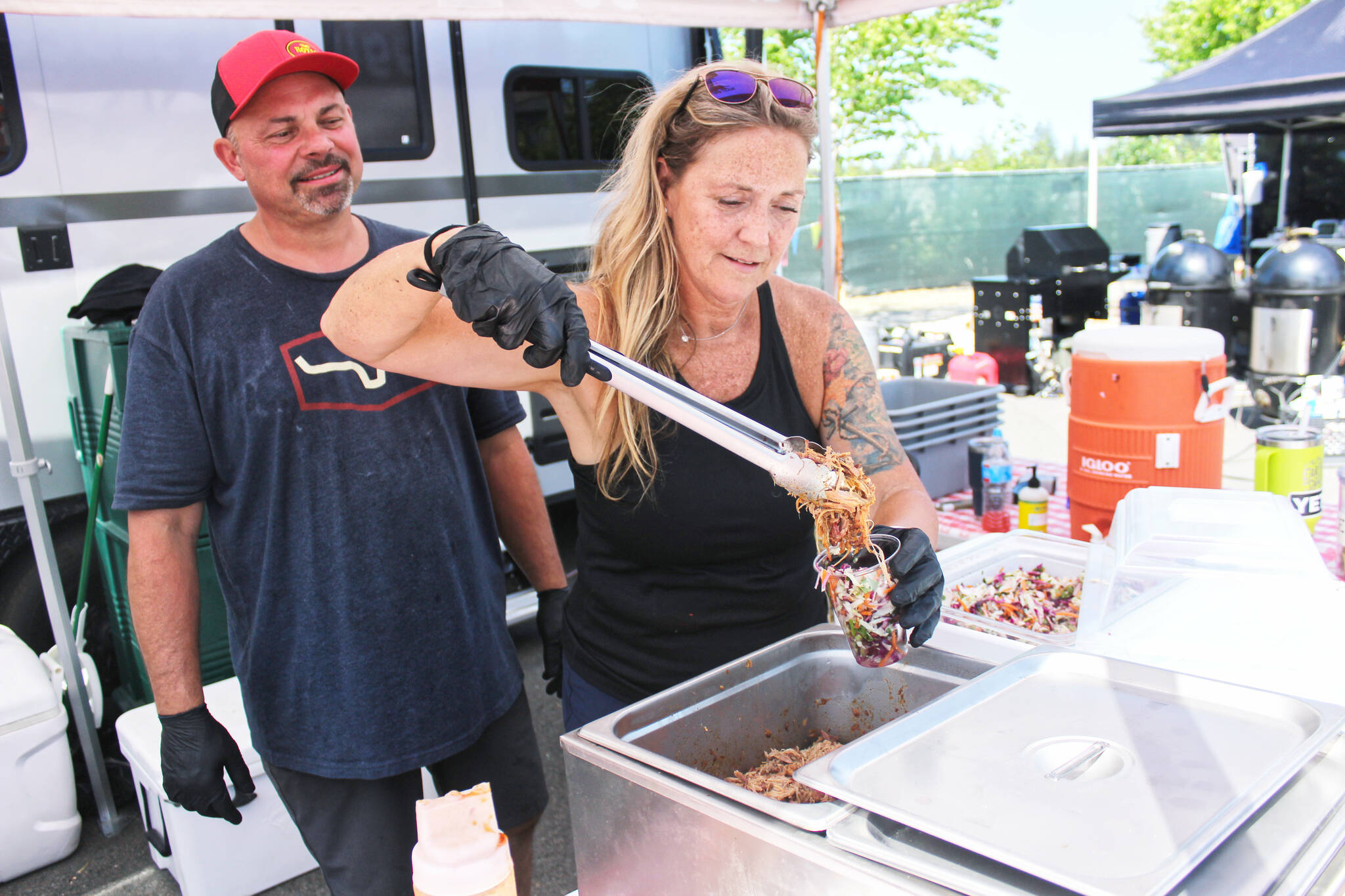The weather was hot, but the grills were hotter as barbeque was served up at the Black Diamond BBQ and Brew Fest.
This last weekend, nearly two dozen competitors from across the Northwest battled to be crowned Grand Champion by the Pacific Northwest BBQ Association at the event. Each team had to prepare pork, brisket, chicken, and ribs, with judges taking a hard look at presentation, flavor, and texture.
The competition was filled with seasoned veterans of the barbeque world, including two cooks from South King County.
Auburn resident Rob Rapier, a graduate from a culinary school in San Francisco, worked his career in construction before retiring and transitioning into competitive barbeque. As a former athlete, he loves the competition and the drive for victory.
“I played sports all the way through college, and I can’t do that anymore, so this feeds the competitive side of my personality,” Rapier, who cooks for Hogs, Hens and Heifers, said. “I went to culinary school in San Francisco, and I ended up going into construction, so when I retired, I took up completive barbeque again, and it’s a natural transition for me.”
Rapier said he had a unique approach to barbeque, and explained that the perfect dish is the result of successful flavor profiles.
“Barbeque is more like chemistry than it is culinary,” Rapier said. “It’s not about throwing in different seasonings, there’s a percentage. I might use four different rubs on one meat, two might go on light, maybe one goes on heavy and one medium. The rubs have to complement each other and compliment the meat.”
Rapier, who said is specialty is chicken — despite how difficult this meat can be to prepare for this competition — acknowledged the difficulty in winning the competition amongst such talented chefs, but is confident in his abilities.
“It’s so competitive, everybody that has been barbequing, competition wise, for a long time has really invested a lot of time in their flavor profile,” Rapier said. However, “I have a whole plethora of rubs and sauces. It’s taken me two years to come up with it, each meat category has different sauces, different rubs.”
Rapier took first in the individual chicken category, and with his eighth place in pork and ninth place in brisket (he didn’t place in ribs), took ninth overall out of 21 competitions.
Ron Hedin, a carpenter out of Covington, was another competitor. He has been participating in barbequing competitions since 2017 after an interesting introduction into the community.
“Me and a coworker, he was an iron worker and I was a carpenter, both did barbeque and we were always talking smack about who’s is better,” Hedin said. “So, we decided to have a competition, and it was supposed to be at the job, but we realized that wouldn’t work because the iron workers would vote for him and the carpenters would vote for me, and that wouldn’t be a true thing. So, we found out about a barbeque competition happening in Puyallup and we decided to sign up and compete. Neither of us knew what we were getting into, but we did the best we could, and after that, I got hooked.”
Hedin’s initial, simple work rivalry has spawned into a six-plus year barbeque competition love, and while working at Hoggin Da Sauce BBQ, has several accolades to signify he won the beef. This includes placing 20th in the American Royal, considered the largest BBQ competition in the world, out of nearly 500 teams.
Unlike Raipier, Hedin said the key to a perfect barbeque is texture.
“If you ask a majority of all these guys that have been here for a while, they’ll tell you it’s texture,” he continued, explaining how different meats need a certain resistance and that judges are looking for clean bites — but not for the meat to simply fall off the bone. “If you’ve got a poor presentation, that’ll hit you pretty hard too, but the main thing for a certified judge is texture, texture, texture.”
Hedin added that chicken is the hardest to prepare, since the chicken skin can’t slide off the meat with a bite; pork and brisket is his specialty. He placed third in pork, fourth in chicken and ribs, 12th in brisket, and earned third place (Reserve Reserve Champion) overall.
He said his earning third was “surprising because I didn’t think my cook didn’t go too well,” though he admitted he’s his own worst critic. “Not bad for taking a year and a half off.”
While Rapier and Hedin’s choice in meats and their strategies for standing out to judges may be different, both competitors agreed that timing is everything; each meat can take wildly different times to perfectly prepare, which means starting to cook hours and hours before presenting the plate and constantly jumping between the meats to make sure they’re cooking correctly.
But at the same time, they have only a small window to present judges with their samples, which means putting a plate together has to be done at the very last minute.
Despite the fact that everyone was vying to be named Grand Champion, there’s a sense of community that overshadows rivalry.
“The best thing about the barbeque is everybody is truly family, even though we are all competitors,” Hedin said. “I’ll forget something, someone else will forget, and although everyone is a competitor, we all help each other. In this world, where there is so much friction, that is one of the best parts of the whole barbeque competition world.”


